Letter from the Director: November 2021
This letter is part of a monthly series from the Director of the CRC, Dr. Michelle Amazeen.
Facebook’s WALL-E Moment?

When Facebook announced it was changing its name to Meta last month, the Disney-Pixar movie WALL-E (2008) was the first thing that came to my mind. The sci-fi movie was about a robot left on an uninhabitable Earth to clean up the garbage left behind by humans. Rampant consumerism and corporate greed had left Earth a wasteland, and humans were evacuated to outer space. In this same way, I envision Facebook abandoning the real world for the virtual “metaverse.” They leave behind unimaginable quantities of disinformation amplified by their algorithms along with harassment, hate speech, and angry partisans.
To move beyond my initial reaction and gain more insight into the implications of Facebook’s name change (and strategic plans) from a communication research perspective, however, I turned to two research fellows within COM’s Communication Research Center (CRC) who study emerging media.
Media psychologist and COM Assistant Professor of Emerging Media Studies James Cummings indicated that a Metaverse – if successful – would produce new issues in information processing and would place a new emphasis on theories of interpersonal communication rather than just mass communication. As I feared, he also said it has the potential to augment existing media effects of concern related to social networking such as misinformation, persuasion, "addiction," distraction, etc.
First, Cummings explained there would be major implications for how billions of people select, process, and are influenced by media content. To be successful, the Metaverse platforms will need to transform current modes of information processing and computer-mediated communication interactions into much more immersive, cognitively absorbing experiences. “For instance,” he said,
“The mainstreaming of consumer-facing immersive ‘virtual reality’ (VR) – which typically place high demands on users' processing – will be coming in an age of media multitasking. Interfaces will need to figure out how to immerse users while still permitting them to access different information streams. Similarly, mainstreaming ‘augmented reality’ (AR) experiences will also mean requiring users to skillfully juggle attentional demands, multitasking between virtual and real-world stimuli. These are common practices for hobbyists, but may present more of a learning curve for a broader population of users.”
Thus, Cummings suggests, if the Metaverse is the ecosystem of devices and experiences CEO Mark Zuckerberg envisions, users will be switching back and forth between different types of immersive experiences and stimuli (reality, AR, VR, etc.). “This scenario, if brought to fruition, will be ripe for excitation transfer, priming, and other media effects based on sequential experiences” he said.
Second, Cummings expects that a successful Metaverse would mean exchanges with mediated stimuli that are much more like face-to-face or interpersonal interactions. “This will require designers to master key elements of media richness theory and factors influencing users’ sense of spatial and social presence,” he explained. In other words, social networking and other Metaverse activities may not only entail extractive information processing (in the form of reading text, examining pictures, watching video, etc.) but increasingly also immersive perceptual experiences (a sense of transportation and/or colocation, the processing of nonverbals, etc.).
Finally, Cummings indicates that immersive media are rife for a whole new breed of covert persuasion – such as “native advertising,” or ads that mimic their surroundings – to the extent that users confuse the perceptually plausible with the real. He’s particularly interested in seeing the impact of immersion on users’ perceptions of message authorship and authorial intent.
Indeed, back on Earth, native advertising has been widely adopted to covertly promote not only commercial products, but also political candidates. Candidates are increasingly relying upon “influencers” to post supportive messages on Facebook and other social media without consistently disclosing they are being paid to do so. As I have previously addressed here, if the regulatory agencies that oversee advertising – both commercial and political – have not been able to keep up with the digital transformation of our media ecosystem, how will they be able to regulate the Metaverse?
For COM Associate Professor of Emerging Media Studies Chris Wells, the promise and pitfalls of the Metaverse depend entirely on how Facebook rolls it out. For example, the radical network effects we see from social media rely to some degree on the extremely shortened forms of communication—short texts and short videos—that allow information scanning and selection on a very rapid scale. He indicates the pseudo-social presence of virtual reality would seem to reduce the number of people you can actually interact with. “How will the Metaverse be organized and who will you be able to interact with?” Wells asks. Are people going to have coffee virtually? Virtual meetings? He suggests that a site such as Second Life may offer rudimentary evidence of the kinds of interactions that emerge when people engage with strangers in a massive virtual world.
Presumably, Wells suggests, Facebook will still have to provide a great deal of content moderation in the Metaverse if people are to have any interactions outside tightly defined networks. “Given Facebook’s track record with their current platform,” Wells says, “this could well be an unmitigated disaster; but expecting this may lead them to tightly control who interacts with whom and in what ways.”
Second Life notwithstanding, Wells also questions who will actually want to engage in such a virtual space. “My read of the pandemic is that people don’t particularly want to keep sitting in their bedrooms and interacting through Zoom,” he said.
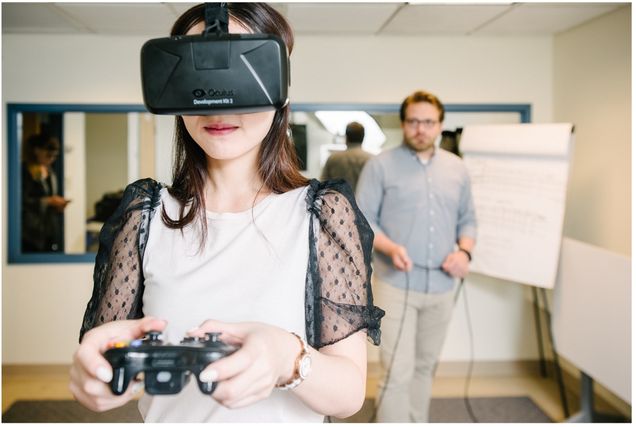
“Will wearing an Oculus headset make that a lot better? I’m not sure. But I also suspect that there are at least a lot of people for whom going to a virtual concert or playing virtual chess with a friend in the park are paltry substitutes for the real thing.”
He concedes that there are a lot of Millennials and Gen Zs who spend a lot of time in their bedrooms on video games, with digital avatars, and so forth. One possibility, says Wells, is that the Metaverse becomes a niche space for these sorts of folks.
As these Metaverse developments take shape, CRC fellows are well positioned to monitor these emerging media uses and perceptual effects. The CRC has multiple Oculus virtual reality headsets that can be paired with our psychophysiological measurement tools. For as technology takes us to new realms, we have a responsibility back on Earth to analyze and understand how humans are affected.
If you are interested in learning more about the CRC’s technologies or research, please contact Lab and Research Manager Lindsy Goldberg at crccom@bu.edu.
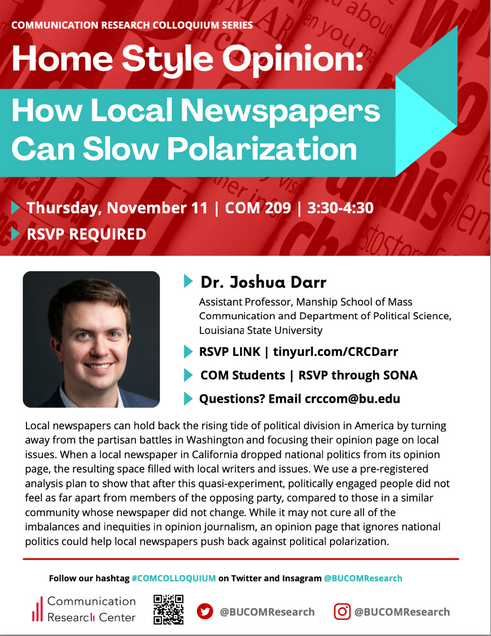
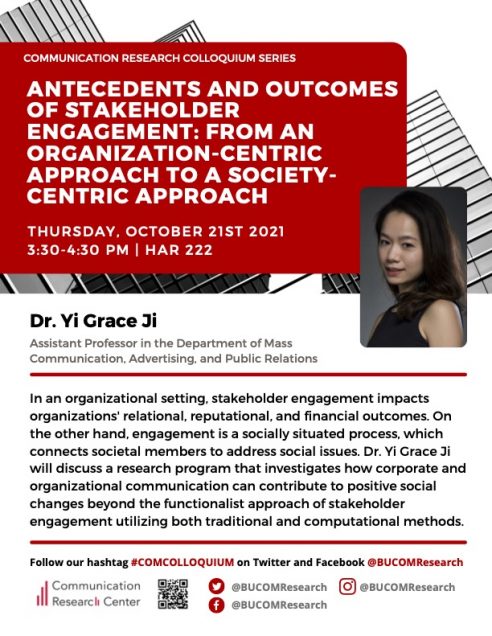
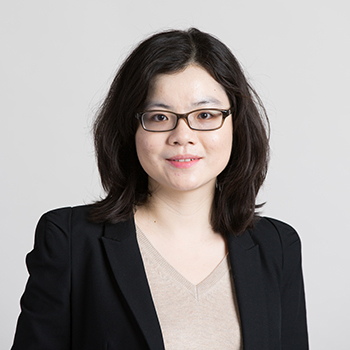
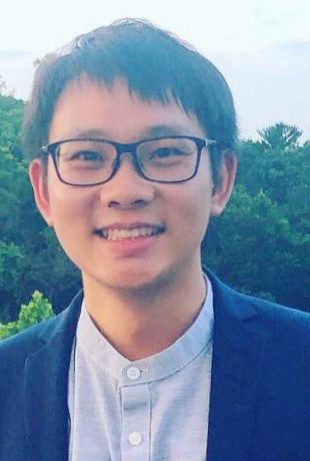
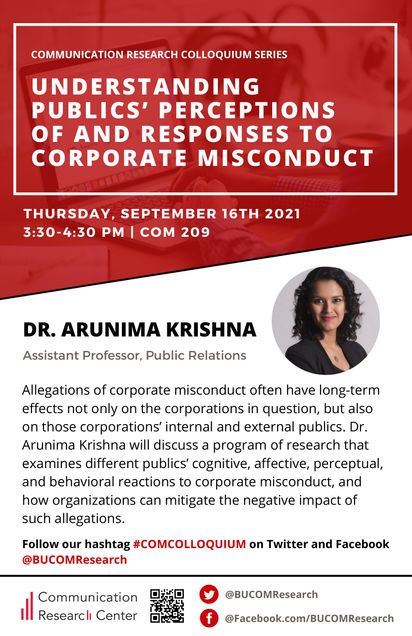
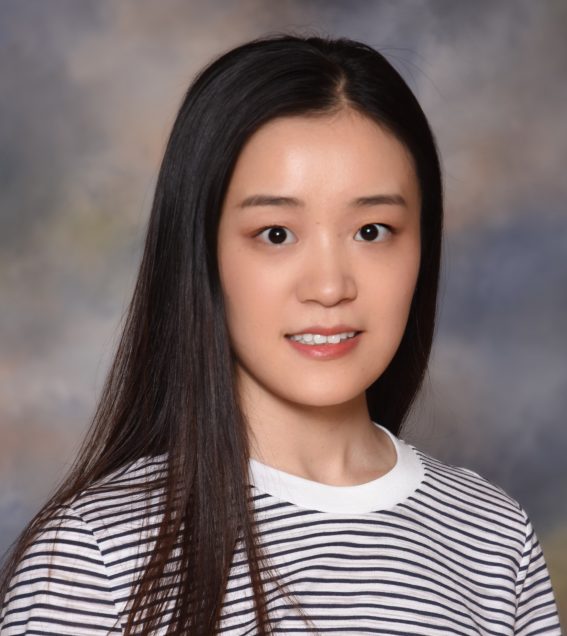 Congratulations to Jiaxi Wu,
Congratulations to Jiaxi Wu, 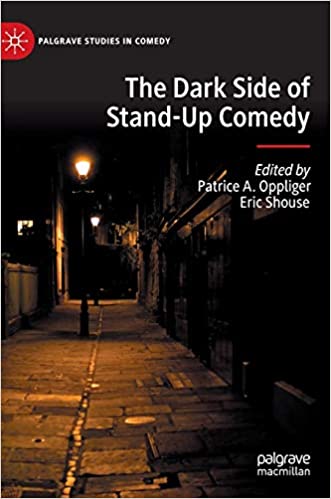 "The Dark Side of Stand-Up Comedy," a new book co-edited by Patrice Oppliger (CRC fellow) and Eric Shouse, is now available for purchase.
"The Dark Side of Stand-Up Comedy," a new book co-edited by Patrice Oppliger (CRC fellow) and Eric Shouse, is now available for purchase.